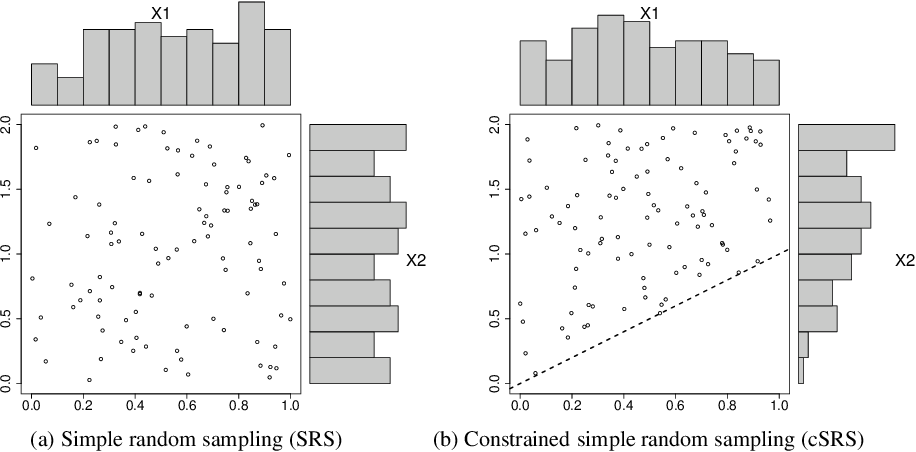
Druzdzel Decision Systems Laboratory School of Information Sciences and Intelligent. Papers also reflect shifts in attitudes about data analysis (e.g., less formal hypothesis testing, more fitted models via graphical analysis), and in how important application areas are managed (e.g., quality assurance through robust design rather than detailed inspection). Latin Hypercube Sampling in Bayesian Networks Jian Cheng & Marek J. For more than twenty years, the Latin hypercube sampling (LHS) program has been successfully used to generate multivariate samples of statistical distributions. Discrete version of LHS is also presented for reliability evaluation. This includes an emphasis on new statistical approaches to screening, modeling, pattern characterization, and change detection that take advantage of massive computing capabilities. Latin Hypercube sampling (LHS), which has many desirable features of stratified sampling and random sampling has been successfully applied to generation system reliability evaluation. Correlation between the input parameters is taken into account using the rank-based method of Iman and Conover (1982). Latin hypercube sampling is a recently developed sampling technique for generating input vectors into computer models for purposes of sensitivity analysis studies. 400 samples were selected where each sample consists of a parameter set. Papers in the journal reflect modern practice. The Latin Hypercube Sampling method (Helton and Davis, 2003) was used for probabilistic sampling of the fluid parameter space. Application of proposed methodology is justified, usually by means of an actual problem in the physical, chemical, or engineering sciences. Its content features papers that describe new statistical techniques, illustrate innovative application of known statistical methods, or review methods, issues, or philosophy in a particular area of statistics or science, when such papers are consistent with the journal's mission. An application of the LHS technique in the field of rock slope stability assessment will then be discussed.The mission of Technometrics is to contribute to the development and use of statistical methods in the physical, chemical, and engineering sciences.
LATIN HYPERCUBE SAMPLING PDF PDF
Keywords: Latin Hypercube Sampling, Kriging Models, Reliability Assessment 1. The efficiency Latin hypercube sampling of IS is highly dependent on the new selected PDF m(X). This method keeps the certain level of accuracy in prediction of the response of a structural finite element model or other explicit mathematical functions. The development of the LHS technique will first be described and then compared with the Monte Carlo sampling technique. For reserving original sampling points to reduce the simulation runs, two general extension algorithms of Latin Hypercube Sampling (LHS) are proposed. an effective method to have reliability assessment by Latin Hypercube sampling based Kriging surrogate models. This has been successfully applied to rock slope stability analyses concerning plane and wedge failure and has been found to represent the original data more closely than could Monte Carlo sample sets of the same size. , x KT with probability density function f(x), the procedure is as follows.

To generate a sample size N from K variables xx 1, x 2. Latin Hypercube Sampling of Gaussian random field for Sobol’ global sensitivity analysis of models with spatial inputs and scalar output Nathalie Saint-Geours Frédéric Grelot Jean-Stéphane Bailly Cemagref, UMR G-EAU AgroParisTech, UMR TETIS F-34093, Montpellier, France F-34093, Montpellier, France, Christian. All the areas of the sample space are represented by input values. LHS, in essence, is a constrained randomisation sampling scheme which is sensitive to the extreme values of the data range. 3 Latin Hypercube Sampling (LHS) 3.1 Method The Latin Hypercube Sampling 4-6 is a type of strati ed Monte Carlo sam-pling. However computation time can be substantial if significant sampling errors are to be avoided.Īn alternative approach has been developed which uses the Latin Hypercube Sampling (LHS) approach to the same algorithms. Such analyses have been succesfully solved using a Monte Carlo Sampling approach based on well-established deterministic algorithms. Firstly, a FE model is developed to simulate the working status of helical springs. A probabilistic approach to slope stability analysis allows the observed natural variability of many parameters to be taken into consideration. Latin Hypercube sampling (cLHS) and Genetic Programming (GP) techniques, is developed to improve the accuracy of design and to expend the design domain of helical springs.


 0 kommentar(er)
0 kommentar(er)
